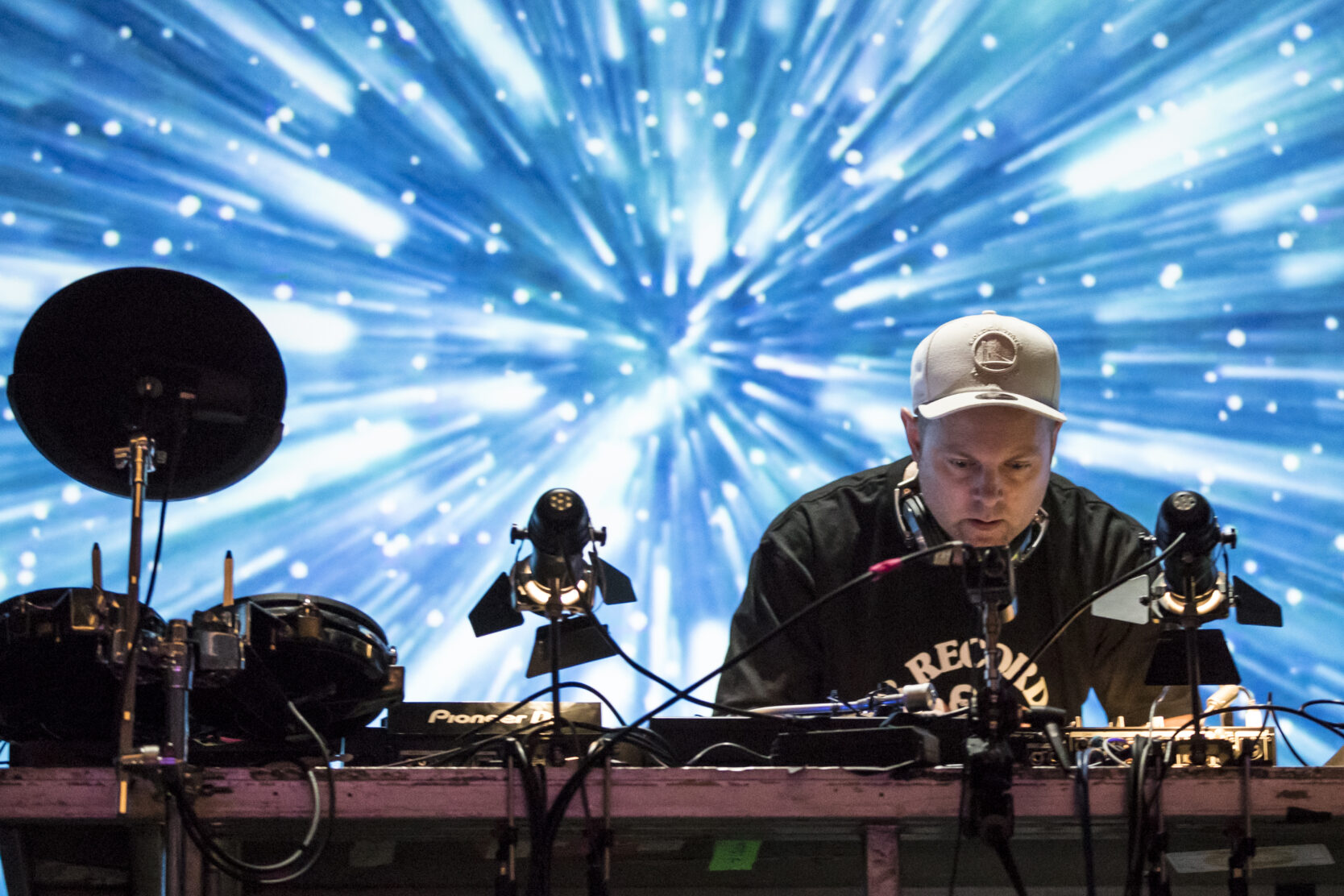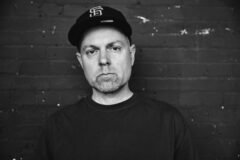DJ Shadow has long been revered as one of the pioneers of crate digger-driven instrumental beat music, but populating his upcoming album Action Adventure almost exclusively with vocal-free songs was inspired less by tradition and more by what he sees as a worrisome trend in how artists exchange creative energy with one another.
“The idea of a quote-unquote electronic producer or beat maker reaching out to vocalists has been done to such an extreme that I have found, more often than not, when I reach out to a vocalist, it isn’t so much like, oh, great, let’s do something completely different, as it is, what’s your social media reach? What’s your budget?,” the 51-year-old artist born Josh Davis tells SPIN over fruit and crudités at a downtown Brooklyn office. “Once I started getting that vibe, I just immediately was like, nah, I don’t want to do this.”
Over two-and-a-half decades on from his landmark 1996 instrumental debut album Endtroducing, Shadow is the first to acknowledge that his top streaming tracks feature rappers such as Run the Jewels (“Nobody Speak”) and De La Soul (“Rocket Fuel”). This time around, he says “it just seemed like what once felt interesting and like a rewarding way of artistic expression suddenly felt less than rewarding and sort of rote. I decided, well, let it be what it is. I have to be fully invested in the artistic before I can worry about the economic, and the economic will come if the artistic is pure. I know that sounds old fashioned, but that’s the only way I’m comfortable putting my stuff out.”
That uncompromising vision remains on full display with Action Adventure, out on Oct. 27 from Mass Appeal/Liquid Amber. As usual, Shadow found serendipitous inspiration from a number of sources, including a collection of 150 cassettes featuring multi-genre mix shows made by the Numarx crew for a Baltimore radio station in the 1980s (in an odd twist, Numarx went on to write the future Milli Vanilli one-hit-wonder “Girl You Know It’s True”).
“It was R&B mixed with club records and other types of emerging early house-type influences. Hearing them was like having somebody stir up all these records that I loved and hadn’t heard in years — in a lot of cases, decades — in a totally different way,” says Shadow, who found himself reticent to listen to contemporary music during the pandemic “because it was of this current era, which I wanted to escape badly. It felt emblematic of the conditions and the thought processes that had led us to that point. Literally, those cassettes were like a bridge back to feeling good.”
Action Adventure isn’t exactly a happy-go-lucky listen, but its expertly curated variety of sounds and styles is a powerful antidote to the increasingly homogenized world of computerized music-making atop today’s charts. “Free for All” is like some alternate universe crossbreed of Lynyrd Skynyrd and dubstep, “You Played Me” screams ‘80s with its Harold Faltermeyer-style synths and impassioned vocal sample, and songs such as first single “Ozone Scraper” and “Time and Space” revel in vaguely ominous vintage electro vibes.
Of “Free for All,” which samples obscure early ‘70s rock band Dust’s “Loose Groove,” Shadow admits the far-out marriage of genres turned it into “one of the tracks that I literally for six months was like, should I? Could I? Did I? It was a relatively straightforward clearance, fortunately, but a lot on the album were not. They were a nightmare. You almost just want to say to people, I know you haven’t made more than five cents off this song in decades. It does not exist. It’s not streaming. It’s not doing anything. It’s a lost song that I’m here to help revitalize. And they’re just like, yeah, whatever. This is what it costs.”
On the other end of the spectrum, Shadow says the Kraftwerk-inspired “Time and Space” is “about as naked as I will allow my influences to be. These five records that meant a lot to me, put in a blender, equals this. Usually, I don’t like it to be that straightforward and linear, but I’ve wanted to make an electro record for a long time. It’s not as easy as you would think in a weird way, because there’s so much subtlety. That’s what makes Kraftwerk records work so much better than everybody else who tried to make them at the time. It’s a lot of little things that keep everything moving and nothing ever feels too robotic, ironically.”
Shadow, who is now an empty nester with his wife after their twin daughters went away to college this fall, will embark on his first proper North American tour in six-plus years in late January. And while Endtroducing was celebrated with a lavish 20th anniversary reissue in 2016, he says not to hold your breath for a similar treatment of its excellent 2002 follow-up, The Private Press. The Mos Def-featuring remix of that album’s song “Six Days” is by far Shadow’s most-streamed track, with more than 160 million plays on Spotify to date.
“I really pick and choose those moments pretty carefully, and I don’t actually get a lot of pleasure out of revisiting old projects that much,” he says. “Endtroducing was as close to a full, Criterion-style version of that album that I could ever do, which was cool, but it takes a lot of energy. I am more comfortable making new music and trying to continue to push things forward than I am looking backward.”





